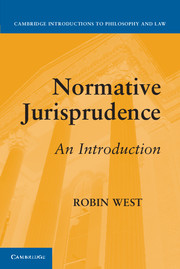1 - Revitalizing Natural Law
Published online by Cambridge University Press: 05 June 2012
Summary
Modern liberal and progressive American lawyers are more than a little squeamish about the Natural Law tradition in jurisprudence. It is no wonder. In the United States, during the twentieth century alone, the Natural Law movement has been the intellectual home for a Catholic law school–led revolt at mid-century against New Deal lawyers and theorists; an overwrought identification of Justice Oliver Wendell Holmes, legal realism, and American pragmatism with fascism; a late-twentieth-century critique of gay rights and gay life that rests on little more than disgust with noncoital sexuality; and an attack on the separation of church and state that threatens hard-won civil liberties for nonbelievers and religious minorities. All of this strikes many liberal and progressive lawyers as not only misguided but decidedly beyond the pale – an assault on positions that perhaps at one time were controversial but are no longer so, and on legal figures that, for many, are now iconic. The Administrative State; the legacy and liberal credentials of the decidedly complex figure of Oliver W. Holmes, a bland but clear-cut policy of nondiscrimination against gays and lesbians; and a cleanly separated establishment of state versus church strike most lawyers as relatively unassailable liberal and legal achievements. A Lochner-era rigid libertarianism that precludes administrative softening of market excesses, a punitive stance toward victimless sexual variation, and an aggressively Christian nation, by contrast, strike most liberal American lawyers as a politics of religious chauvinism at worst and of distraction from more pressing political dangers at best. Any jurisprudence that flirts with all of these views – and in the century just closed, natural law clearly has – seems to be, in a word, spent: a thoroughly discredited and indeed regrettable strand of thought that is perhaps still of interest to legal historians but the central claims of which are, however, best left in the dustbin of history.
- Type
- Chapter
- Information
- Normative JurisprudenceAn Introduction, pp. 12 - 59Publisher: Cambridge University PressPrint publication year: 2011

